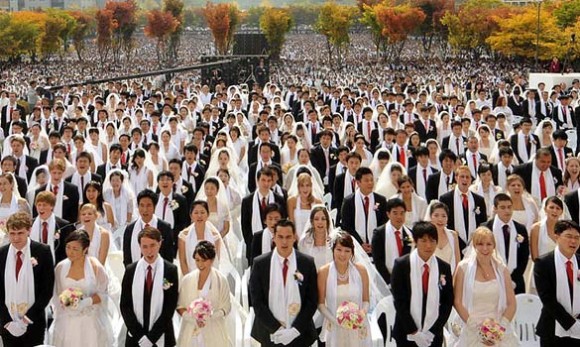Unmarriage

“Unmarriage until gay marriage, no marriage until gay marriage.”
That is the phrase that will chime through the streets, Feb 14th in central park. Rev. Billy and his gospel choir are at it again. This time they are inviting married couples to unmarry. Ditch the vows. Shed the rings. No marriage until all can marry.
A mass ceremony, conducted by Rev. Billy himself, will unmarry those who are standing up for the rights of the gay community. Is this really official? I don’t know if you can actually unmarry, but who says you are married anyways? Or what defines marriage since it varies from culture to culture and religion to religion? It seems unconvincing that by a simple ceremony you are deemed fit to cohabit until death, produce offspring, receive certain tax breaks and share toothpaste.
My cousin and her partner are sincerely committed to each other, have lived together for ten years and have never participated in any sort of ceremony that declares them legally married. Then there are those who have grand ceremonies declaring their commitment and love for each other and they don’t make it past raised toilette seats and maxed-out visa cards. If a ceremony is so trivial in both these instances why is it being withheld from same-sex couples?
Unlike Canada, there are still states in our neighbor country where gay marriage is illegal. For details about same-sex marriage in the U.S. see here. Same-sex marriage has been legal everywhere in Canada since July, 2005.
I don’t know what I think of the whole thing as you can see from the scads of question marks. If you are like me and have more questions than answers you can check out freedomtomarry.org and see what questions they are answering. – megan kamei, editorial assistant
I asked Aiden what his thoughts were and here is what he said:
I like the references to your cousin and other attitudes to the marriage ceremony, but I’m left with the feeling that you think it’s just a ceremony and not a powerful institution of control: of men over women, of dominant culture over those who don’t choose partners of the opposite sex. I look at how institutions attain, retain and abuse power. In the case of the institution of marriage, it’s a very tangible expression of the “family values” that are so problematic for many people. Feminists, women who suffer, singles, childless couples, men who don’t identify as heterosexual, young people who are dating: each of these (and other) important groups of people are invited (often coerced) into conformity, at the cost of their humanity and the loss of diversity in our community.
2 Comments
Sorry, comments are closed.


I really like Aiden’s comments on this topic.
Marriage should be extended to gay people. But the benefits and respect that comes with marriage should also be available to those who don’t marry.
Alan February 12th, 2010 10:12pm
It is almost thirty years now since I went through one of the toughest weeks in my life. It was the week that I was married. Don’t get me wrong, I dearly loved the person I was about to marry and we had already covenanted to each other some time before the wedding, but now we were about to make our covenant public; to ask for the blessing, support and respect of the community and the divine and to acknowledge that we would respect the call to accountability that our beliefs and our community could expect of us through this public covenanting. This was (and is) a big deal for me. I don’t like to make promises unless I intend to keep them and to make this promise before the community is another step that provides additional support and additional responsibility to uphold my commitments.
While it is appropriate that Aiden points out the many ways that a solemn and positive ceremony can be used to justify very unjust and disrespectful practices, I wish he would have also pointed out that the important part of a marriage ceremony is that it is a covenant making. In our case that covenant making included mutual respect, equality, support, accountability, love. It has nothing to do with whether or not we are the same gender. If one of us disrespects, dishonours, exercises power over the other, etc., etc., we are dishonouring the covenant we have made with each other, the community and the divine. Likewise, if the community tries to impose conformity rather than call us to accountability, they are dishonouring covenant. Let us not confuse the two and let us remember that in community, both the individual and the community are called to mutual respect, honour. Let us also remember that covenant is about good relationship and dishonourable actions damage good relationship.
When someone in the community tells me ‘this is my partner’ I assume that theirs is also a relationship that involves some sort of covenant, whether they have articulated it or not and that I should respect and support that covenant as far as I can understand it. This is not as easy to wade through in a society where a wide variety of beliefs, values and practices exist and it is only through respect and honest attempts to understand that we can make progress towards community in a pluralistic society.
John Bartel February 26th, 2010 4:31am